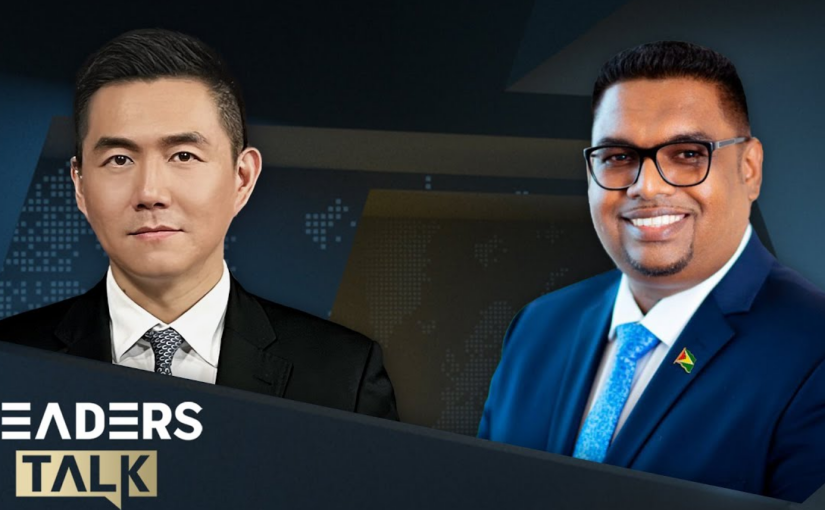In this edition of the CGTN series Leaders Talk, Wang Guan interviews Dr. Mohamed Irfaan Ali, President of Guyana. The only English-speaking country in the South American mainland, for reasons of historical and cultural background, Guyana is also considered a part of the Caribbean. In 1972, Guyana became the first country in the English-speaking Caribbean to establish diplomatic relations with China. And in 2018, it became the first country in South America to join China’s Belt and Road Initiative (BRI).
But whilst China and Guyana have enjoyed just over 50 years of diplomatic relations, the Chinese presence in Guyana dates back to 1853, which leads President Ali to describe Sino-Guyanese relations as imperishable ones, based on shared ties of blood and history. The Chinese, he says, are part of our country and its diversity and bloodline. This finds expression in a line of the Guyanese national anthem: One land of six peoples, united and free.
Indeed, the first President of Guyana, Arthur Chung, was himself of Chinese heritage, serving between 1970-1980 and visiting China in 1977, five years after the establishment of diplomatic relations. Opening the Arthur Chung Convention Centre in 2015, then President David A. Granger said: “I would like the first President in this country to be remembered… This is the 45th anniversary year of becoming a Republic and Mr. Chung was the first person of Chinese descent who was President in a non-Asian country and it was historic.”
With the recent discovery of massive oil reserves, Guyana has been registering exponential rates of economic growth. President Ali reveals that by 2027-28, Guyana is expecting to produce close to one million barrels of oil per day (bpd). He wants to use this to give the people the best possible education and health care, develop and diversify agriculture, enhance manufacturing and industry, bring down energy costs, meet the housing needs of every single family, and establish proper institutional mechanisms to protect revenues, thereby ensuring that the country enjoys a ‘resource blessing’ rather than a ‘resource curse’.
China is already involved in his country’s oil consortium, but besides welcoming further bids and tenders from Chinese companies, going forward Dr. Ali is particularly keen to see China become Guyana’s most important partner on a path of low carbon development, with gas playing a transitional role, but also focusing on hydro, solar and wind, to fast track green energy development.
President Ali stresses that his country respects the One China Principle and the One China Policy, seeing them as a key plank of international peace and security, just like the regional demand for the Caribbean to be a Zone of Peace. Referencing conflicts such as the ongoing one in Ukraine, he notes that it is the developing world and the poorest countries, who, as a result, face the worst crises in, for example, food and fuel price inflation.
China’s ‘thought leadership’, as expressed, for example, in the Global Security Initiative and the Global Development Initiative, as well as the BRI, can, in the president’s view, contribute especially to the resolution of four key global crises – of inequality, climate change, food security, and energy security. The developing countries, he notes, did not cause these crises, but suffer the most from them.
Stressing that both countries are committed to growing their relations, President Ali says that this work should put people at the centre. If there is investment in the future generations, knowledge and technology transfers, and cultural exchanges, the bilateral ties can only get stronger.
The full interview is embedded below.

